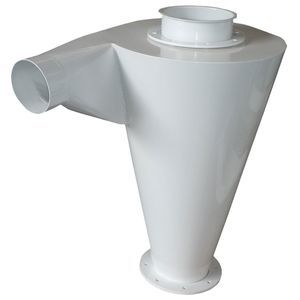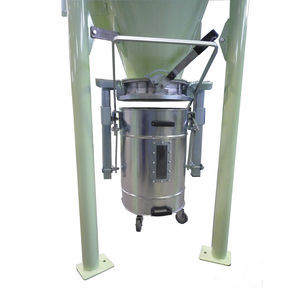
- Products
- Catalogs
- News & Trends
- Exhibitions
High-pressure filter particulatecompressed airdust






Add to favorites
Compare this product
Characteristics
- Designed for
- compressed air, particulate, dust
- Filtration element
- sleeve
- Filtration method
- pressure, cyclone
- Applications
- dust, high-pressure
- Cleaning
- with pneumatic cleaning
- Other characteristics
- conical, tangential
- Operating pressure
Max.: 0.8 bar
(11.603 psi)Min.: -0.5 bar
(-7.252 psi)
Description
The high-pressure filter is used in all those machines operating with air in their system, therefore needing cleaning systems to filter the air before reinserting it in the ambience. For this reason, it is mainly used for pneumatic conveying systems or aspiration systems.
G&AS filters employ cyclonic settling through the tangential inlet in the first place; then the air passes through a group of filtering sleeves, going from the outside to the inside, thus dropping the dust off on their external surface.
A temporised upstream jet of air cleans cyclically the filtering fabric.
The high-pressure jet filter uses compressed air at 7 bars for the cleaning operation. The air enters through electrovalves and pipelines with entry holes. Each electrovalve can release compressed air to groups from 2 to 7 sleeves at a time. An external tank feeds and connects all the electrovalves.
The high-pressure filter is composed of cylindric elements made of metal sheet, joined together through bolts. It can be flat bottomed, equipped with a motorised extracting impeller or with a discharge cone. The powder is discharged through a star valve that prevents the air from entering the system.
The air goes inside the filter to be processed: the heavy particles of dust go down towards the outlets while the light ones, carried in suspension, are deposited on the external surface of the sleeves, letting only the depurated air pass through. An electrical adjustable temporiser controls the emission of compressed air inside the sleeves, thus causing them to expand, while dust detaches and fall to the bottom of the filter and is therefore discharged through the rotating valve.
Related Searches
- Solid classifier
- Pressure separator filter
- Centrifugal classifier
- Compressed air separator filter
- Dust pre-filter
- Classifier for the food industry
- Decanter centrifuge
- Easy cleaning pre-filter
- Horizontal decanter
- Air classifier
- Particulate separator filter
- Dust separator filter
- Stainless steel separator
- Cylindrical separator filter
- Washable pre-filter
- Sand classifier
- Decanter for the food industry
- Iron separator
- Cross flow filter
- Sleeve filter
*Prices are pre-tax. They exclude delivery charges and customs duties and do not include additional charges for installation or activation options. Prices are indicative only and may vary by country, with changes to the cost of raw materials and exchange rates.





